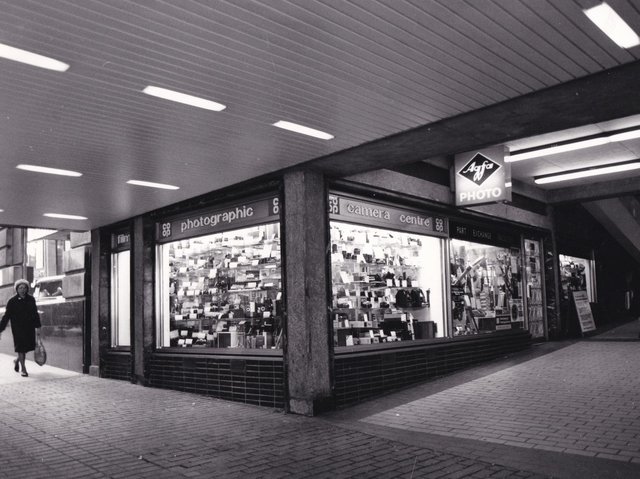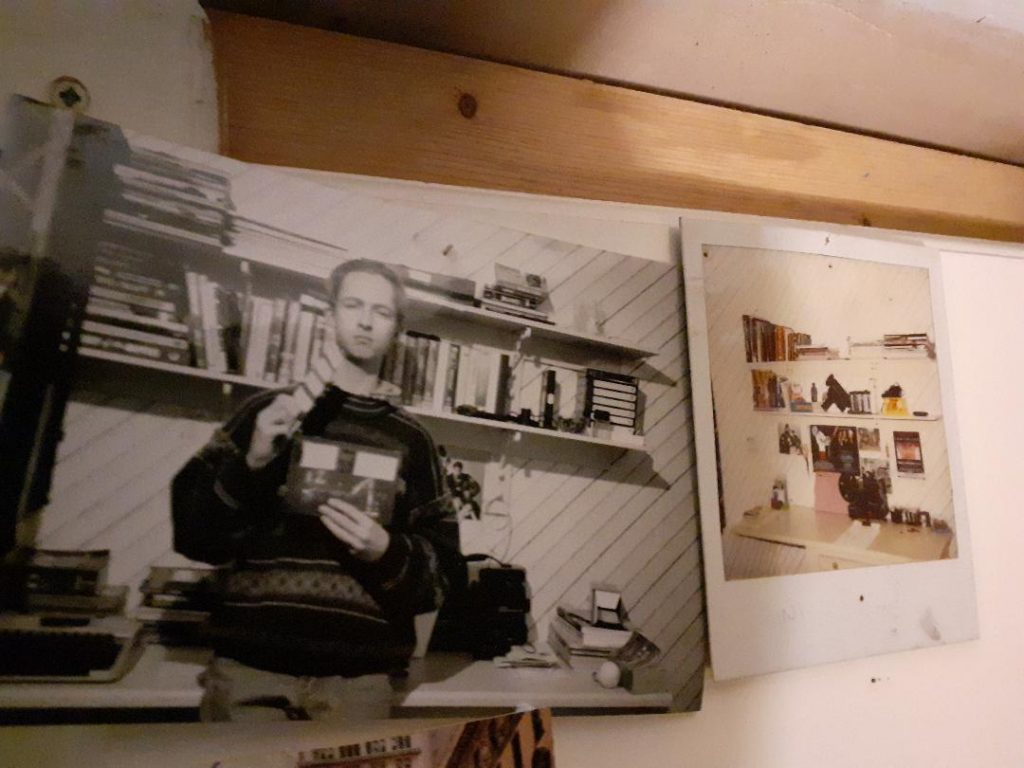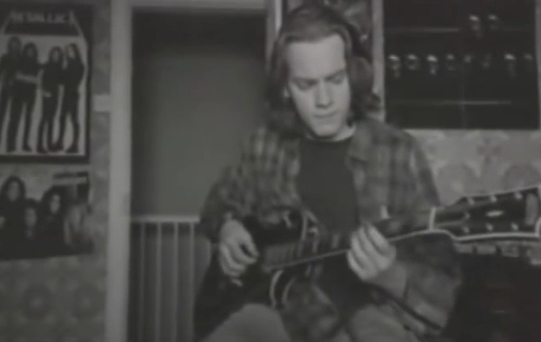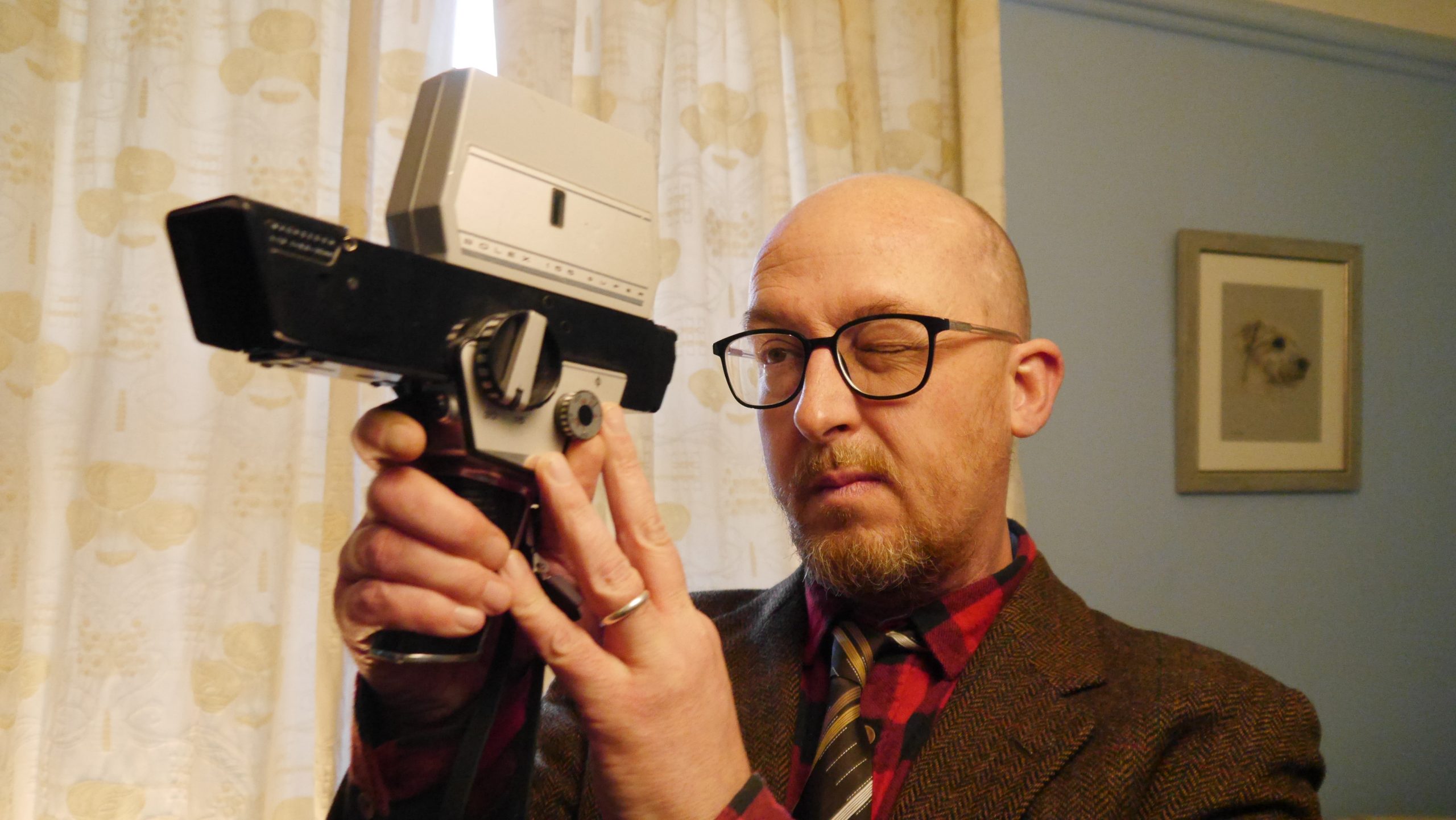Hi my name is Matthew Cooper and I’m a Super 8mm camera expert for hire – for broadcasters and TV and film companies.
I’m massively excited to finally launch this website – something I’ve wanted to do for years.
I saw my first Super8mm film camera when I was in my early teens and it was love at first sight. It was back in the 80s and I was at a friend’s house, bored, when the friend decided to take out his mum and dad’s Super 8mm camera and projector – this will have been around 1986. Super 8mm film was still widely available and cheap as chips too.
Video was starting to kick in (this was around the time Marty McFly was shooting video in ‘Back to The Future’ but video cameras were very expensive and there was no real way to edit videos on a budget). I’d never ever seen a Super8mm camera or projector. Nobody in my close or extended family ever shot much Super 8mm as far as I can tell.
I watched as my pal threaded up the projector and we saw a holiday film his family had shot while abroad. I must admit, I was kind of stunned, and looked at the equipment with awe. A couple of years later, when I was about 12 or 13 I found a shop in Leeds City Centre – where I’m from, which sold second hand Super 8mm equipment – another revelation for me.

This shop was called the Co-Op camera centre (pic above taken in 80s). I was only 12 or 13, and I didn’t dare go in the shop – which was filled with serious looking adults. I looked at the cameras in the window (and the prices). The camera shop was a bit of a foreign world, and while I wanted to go in, I didn’t at first – then around the same time, in Boots (the chemist) I found they sold Super 8mm cine film – process paid, in sound cartridges and silent cartridges. The films were around £3 for silent and £9 for sound. My brain began whizzing.
After school, on some afternoons, I would go to the local library at Crossgates in Leeds 15, and I’d read books on films, and filmmakers – books focusing on Hollywood – the dream factory. I was a massive film buff, and loved films – I dreamed of working as a director. But I had no real idea how to get from my world into the world of film and TV. Then one afternoon, in the library I found two books on cine filmmaking. I sat in the library and starred at the books.
Then, around the same time I read an article on the director Steven Spielberg – the article talked about Spielberg making Super8mm films in his youth – these films eventually helped lead to a career. This was a revelation to me – I could buy film, buy a camera and shoot my own films – and copy Steve’s career path!
So, for Christmas that year (I was maybe 13 or 14) I asked my parents to take me to the Co-Op camera shop in Leeds and see if I could get a Super 8mm cine camera and a projector. I was allowed £50 for Christmas gifts and starring into the camera shop window – I realised I could maybe get a cine camera and projector for that price (silent camera, my Christmas budget didn’t stretch to sound cameras).
My Dad took me along to the shop – one cold and wintery Thursday night in December. We went into the shop, and looked at a few of the cine cameras – a guy with a long hippy beard and a bald head showed me how to operate the cameras and projectors. We bought a small Eumig camera and a Boots brand projector – both second-hand. I’m not sure what my Dad thought about this choice of present at the time.
On Christmas Day, I opened the kit and started playing about with the camera – I had no film stock yet – and had to save my spending money until mid-January to buy the film stock – from Boots at Crossgates in Leeds.
I’m not sure what exactly I shot with that first reel of Kodachrome Super 8mm film – but once the reel of film was complete (about 3 minutes of footage shot at 18 frames per second) I took the film from the camera and posted the return envelope to the Kodak lab, which as memory services was in Deer Park Road I think this was in Wimbledon in London (funnily enough, years later I passed the lab when I was a scriptwriter on Channel Five’s ‘Family Affairs’ soap opera – I saw the address and did a double take). Once posted – I waited for the film to come back… and waited and waited.
Around three weeks later (which to a 13 year old kid is a loooonnng time) the film came back in the post. I opened the envelope and looked at the black three minute reel. I opened the reel up, and I could see the film I had shot – I could see the individual frames (18 frames a second) I could see each small picture, slightly changed from the last. It was another revelation!
I rushed upstairs and threaded up my Boots projector, like the chap had showed me in the Co-Op camera centre. I put the film, made sure it was threaded to the gate properly, then switched on the bulb and watched – but the footage didn’t appear – and instead what I got was similar to the slit-scan sequence in Kubrick’s ‘2001’. I couldn’t see my footage or the individual frames – I could just see a mess of light.
I rethreaded and retried to play the film many times – then, I became convinced that the projector was broken – the frames on the film itself were correct, but for some reason the projector wasn’t recognising them.
My Dad came home from work, I showed him what the projector was doing, he didn’t seem convinced but that weekend, we returned to the Co-Op Camera Centre in Leeds and the bald chap with the imposing beard looked at the projector (he wasn’t convinced it was broken as he explained they tested all second hand equipment) as a 13 year old I was a bit worried – I’d never taken anything back to a shop before! Oh, the horror….
The man threaded up the projector with a TEST film of theirs, and low and behold as he ran the film – it didn’t project. It was a mess of light and colours. He looked surprised, and then turned to me and my Dad and said – ‘You’re correct – looks like the shutter has broken on the projector’. I was amazed I was right! The guy looked at our receipt (hand written in those days) he then went into the small store room to the left of the counter and came out with another Super 8mm projector. ‘We can swap it for this one’ he said.
I went home with the replacement projector and ran my film through it – suddenly, the footage I had shot (whatever it was) was projected onto my bedroom wall. Then I was really hooked.
From the age of about 13 I began to make two or three short Super8mm films per month – usually silent (I got a sound recording Super8mm camera and projector later in my teens). And I began to take this hobby pretty seriously – these were mostly narrative films – shot in CAMERA without editing – I involved a lot of friends my school at Temple Moor High School in Leeds.

We shot horror movies, action movies and comedies. I made pastiches of ‘Raising Arizona’, ‘Planes Trains and Automobiles’, ‘Sleeper’ and ‘Halloween’. Then as I got older and more confident I shot an original action thriller with pals called ‘Chieftain Hill’. This film was three reels long, very ambitious – it was mostly edited in camera, but I also, on this film, used a splicer for the first time and edited the film properly too, using small plastic splicing tape made by HAMA. It was a huge step forward. (that film is now lost)
I was now 15, in those days a lot of kids left school at 16 if they didn’t want to continue in education. I wasn’t sure what I wanted to do – the only film school I had heard of was the National Film School in Beaconsfield, Bucks. A million miles away and out of my and my families reach financially. So, I left school – but before I did so, at 16, I shot two short ten minute Super 8mm films – a comedy and a thriller.
These two films were my two most professional films to date – both edited with a splicer and both films had sound, and a script written by me (both films are below). These are the first films I had any sort of script for – scriptwriting was the hard part for me – I had no problems with shooting or editing, and by this time I was pretty proficient and had even repaired a Super 8mm camera myself when it developed a fault – I took it apart and reassembled it with a small screw driver! (This is something I still do today, when I buy super 8mm cameras from eBay).
With these two films completed I left school with five C level GCSEs. I got myself I job in a photographic shop in Leeds a few months later on the strength of my knowledge in photography and Super 8mm. The shop was called Bentleyfilms and was a Contax / Yashica 35mm specialist in Leeds. Just around the corner from the Co-Op camera centre, and in direct competition with them.
The job was poorly paid (before minimum wage) and at 16 I was pretty depressed – one of the two short films I shot won a competition in a cine camera festival in London and I was mentioned in some magazine. I didn’t know how to break into film and TV which is what I wanted to do. I read somewhere that writing scripts was the best way to break into the industry. So I started to write scripts, often struggling.
When I was 18 (and still working in the shop) Channel Four in the UK announced a scriptwriting competition for kids under 19. I figured there can’t be many kids writing scripts (like I was) and I wrote a short, moody film and entered into the competition.
To cut a long story short – my script won the first ever Lloyds Bank Channel Four Film Challenge – I left the shop – and ended up getting the short film made and broadcast on CH4 when I was 19 years old.
The film starred a then unknown Ewan McGregor and was a bit of a hit. I ended up going to film school in Leeds, selling a script to Miramax films at 21, getting an agent and ending up as a scriptwriter on ITV soap Emmerdale by the time I was 27 – the youngest writer they’d ever had on Emmerdale.

I wouldn’t have done any of that if it wasn’t for Super 8mm cameras.
My career as a scriptwriter has had ups and downs, I’ve worked on Hollyoaks, Eastenders (Alfie told Kat he loved her for the first time in an episode written by me) and Family Affairs (which I mentioned). I’ve worked as a script writer for hire and UK script consultant for over 20 years now – various projects never got realised – including feature films, and I’ve worked uncredited a lot on various projects.
Another sort of technology has changed my career again – digital video, video editing and digital distribution (distribution more than anything) has allowed me to direct three low budget horror films so far – and get them distributed online. So, I have become a director finally – but partly thanks to the skills I learned as a teenager – self shooting (I acted as director, editor and DOP on my first three films). So, indirectly Super 8mm helped me have the confidence to do it myself.
Funnily enough – in my feature film directorial debut – I ended up using a lot of Super 8mm footage. A tip of the hat to how I started.
So, things have all changed now – the Co-Op camera centre and Bentleyfilms where I worked closed many decades ago – Kodak for a long time STOPPED making Super 8mm film altogether. No new Super8mm film cameras have been made for many years. I sold my Super 8mm kit about 10 years ago.
Then, suddenly, as quickly as Super 8mm died, the analogue resistance came – Kodak announced it would start making Super 8mm stock again, Kodak also announced it would be making a new Super 8mm film camera. That was many moons ago, the film stock reappeared but the new Kodak camera (so far) has not been seen.
Over in the USA a company called Pro8mm had been selling its own super high quality Super8mm film (and cameras) mainly for professional use.
I started shooting Super 8mm film again about five years ago and I haven’t stopped.
Now, with my experience in film and TV, I want to offer my services as a super8mm expert to film and TV crews – Super 8mm is a great format for some drama and comedy shows and its use is becoming very common – however, a lot of DOPs weren’t born when Super8mm cameras were made – and some have (understandably) never used the format – so, that’s what I’m here for – to help film and TV DOPs make the best use of Super8mm – knowing they’re working with Super8mm specialist who is used to working with pro film crews.
I’ve got all the gear, and plenty of experience with the format. I’m also used to delievering to broadcast standard. So, that’s my story, and why I created this website….
If you need Super 8mm in your film of TV production get in touch.
And no, I don’t shoot weddings….
